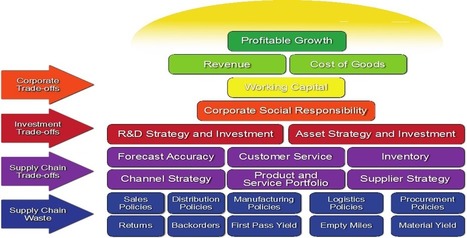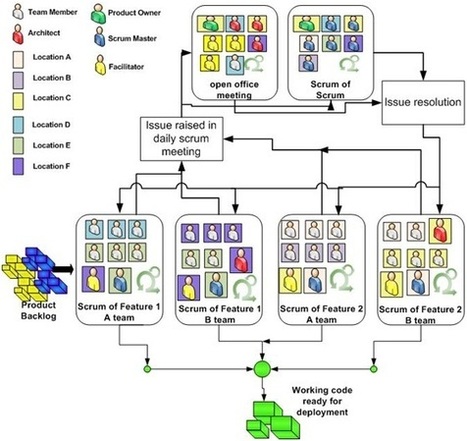 Your new post is loading...
 Your new post is loading...

|
Scooped by
Billy R Bennett
May 13, 2013 12:52 AM
|
Global organization development company offering performance interventions, organization design, and processes to algin people to new strategies and markets

|
Scooped by
Billy R Bennett
May 29, 2013 5:50 AM
|
Wendy Lea: Behind Every Successful Person, There's a Mentor
Wall Street Journal
They can help you untangle facts from feelings, people from the process, product from the market and the individual issues from the organization's structural issues.

|
Scooped by
Billy R Bennett
May 28, 2013 3:17 AM
|
Why leaders should embrace their critics
Globe and Mail
So go ahead, embrace the opportunities – and hug your critics.

|
Scooped by
Billy R Bennett
May 8, 2013 9:57 PM
|
ABC News
Behind Mark Sanford's turnaround
Politico
South Carolinians may not love former Gov. Mark Sanford. They may still have a bad taste in their mouths after his governorship. They may even wonder whether they can entirely trust him.

|
Scooped by
Billy R Bennett
April 12, 2013 12:41 AM
|
We attended Johnson's big presentation in January 2012, when he officially kicked off his turnaround strategy. He told a packed house that, "We can change a brand overnight. And we're going to do that starting 2.1.12." ...

|
Scooped by
Billy R Bennett
April 12, 2013 12:24 AM
|
Telegraph.co.uk M&S boss Marc Bolland asks for time to turnaround clothing Telegraph.co.uk Mr Bolland said a recovery in M&S's clothing will happen “step by step”, playing down hopes that the new management team parachuted into revitalised the...

|
Scooped by
Billy R Bennett
February 17, 2013 7:37 PM
|
Supply Chain Disruption a Major Threat to Business Forbes Two important private sector priorities are the use of exercises to stress-test assumptions and plans, and the development of business continuity or trade resumption plans, protocols and...

|
Scooped by
Billy R Bennett
January 27, 2013 8:14 AM
|
The online version of the Philippines' leading business newspaper features virtually all the stories and statistical data available in the print edition.

|
Scooped by
Billy R Bennett
January 25, 2013 10:41 PM
|
CIC and Ogilvy Public Relations, China have teamed up again to jointly launch the white paper, “2012 Crisis Management in the Microblog Era,” which analyzed 50 Chinese brand crises in 2012 – concluding that brands ...

|
Scooped by
Billy R Bennett
January 25, 2013 9:00 PM
|
THE Performance Improvement Conference 2013 Highlights 'What Works' in the ...

|
Scooped by
Billy R Bennett
January 9, 2013 12:59 PM
|
PROVO, UT--(Marketwire - Jan 8, 2013) - According to new research from the co-authors of the New York Times best-seller Change Anything, 43 percent of employees experienced a déjà vu performance review in 2012 -- negative performance...

|
Scooped by
Billy R Bennett
January 1, 2013 1:54 PM
|
But for others, the improvement is only temporary. That's why it is important to track performance and behavior over time. You can still use. ... She was placed on a performance improvement plan and did improve—temporarily.

|
Scooped by
Billy R Bennett
December 25, 2012 10:23 PM
|
|

|
Scooped by
Billy R Bennett
May 30, 2013 5:45 AM
|
The Effective Supply Chain Frontier – Fact or Fiction?
The 21st Century Supply Chain - Perspectives on Innovative (blog)
... Demand Planning, or Marketing, or Sales, or Inventory Management, or Manufacturing, or Purchasing.

|
Scooped by
Billy R Bennett
May 28, 2013 9:25 AM
|
Despite its popularity, the personality test has been subject to sustained criticism by professional psychologists for over three decades.

|
Scooped by
Billy R Bennett
May 19, 2013 12:15 PM
|
The two owners of Amy's Baking Company Bakery Boutique & Bistro took over the restaurant's Facebook page last night to fight unruly commenters, and man, was it embarrassing.

|
Scooped by
Billy R Bennett
May 8, 2013 4:59 PM
|
By Billy Bennett Some leaders are not leaders at all. They are " Mis-Leaders ." HR leaders often know about managers who defy gravity... they are abusive and they suck the life out of people...

|
Scooped by
Billy R Bennett
April 12, 2013 12:27 AM
|
JC Penney looks to old CEO to secure its future
MyFox Phoenix
Despite improvements, it's not surprising that passengers are getting grumpier. Carriers shrink the size of seats in order to stuff more people into planes.

|
Scooped by
Billy R Bennett
March 28, 2013 6:02 PM
|
BlackBerry CEO Thorsten Heins shrugged off a declining subscription base and said Blackberry is well-positioned for a profitable future.
To innovate, stop worrying about "failure" and start thinking of "learning."
Via Grant Montgomery

|
Scooped by
Billy R Bennett
January 27, 2013 7:45 AM
|
The global elite have again descended on Davos for their yearly pundit-fest. Prognostications have been made, as have commitments to save the world, end poverty, and clean up the environment.

|
Scooped by
Billy R Bennett
January 25, 2013 10:36 PM
|
The research team found little difference in participation levels between the two cohorts for a variety of activities, including performance measurement, working to improve processes or systems of care, monitoring sustainability ...

|
Scooped by
Billy R Bennett
January 16, 2013 5:57 AM
|
How many have you unwittingly followed?

|
Rescooped by
Billy R Bennett
from Align People
January 3, 2013 4:01 PM
|
Related Posts:Agile: From the Business Analysts’ perspectiveUser Documentation in an Agile Development EnvironmentRequirements Elicitation – Important QuestionsSelection of right Code Analyzer tools to build first time rightAgile development is not...

|
Scooped by
Billy R Bennett
December 25, 2012 10:46 PM
|
|






 Your new post is loading...
Your new post is loading...






















